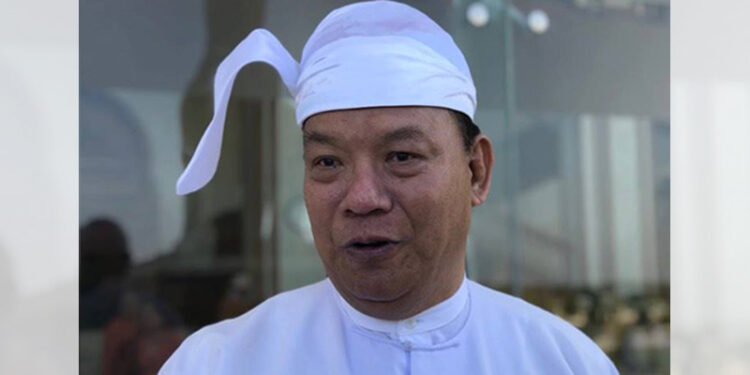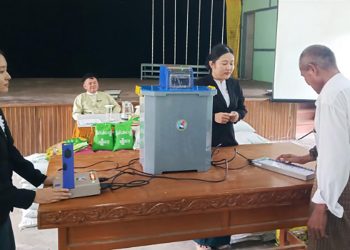NAYPYITAW — Violent conflicts stemming from racial and religious prejudice in northern Rakhine could result in the disintegration of the western state, U Tin Aye, a Lower House lawmaker from the Union Solidarity and Development Party, warned the Lower House on Monday.
“Violent conflicts stemming from racial and religious prejudice have been going on in Rakhine State for a long time. If the terrorist acts of Bengalis — or self-identifying Rohingyas — in Rakhine cannot be checked in their early stages and are allowed to spread like a cancer, Rakhine State could disintegrate,” said U Tin Aye, a former major-general.
The previous U Thein Sein government used the term ‘Bengali’ to refer to the Rohingya, as does military chief Senior-General Min Aung Hlaing.
U Tin Aye made the remarks while asking the government to clarify how it planned to communicate to the people of Myanmar and the international community that there is no such ethnic group as the Rohingya in Myanmar.
“This could lead to disintegration or even result in a failed state. If they dominate our country, we would be forced to leave. I raise the question because I am worried about this,” the Lower House representative from Matman Township in Shan State told reporters after the session.
U Tin Aye retired from the army with the rank of major-general in 2015. In the general election that year he ran successfully as an independent candidate for the Lower House seat representing Matman Township near the Wa Self-administered Zone in Shan State (East). He later joined the USDP.
He said the incumbent government had been silent on the existence of the Rohingya as an ethnic group in Myanmar, despite frequent statements from former President U Thein Sein and Snr-Gen Min Aung Hlaing, the commander-in-chief of the Defense Services, that there had never been such an ethnic group as Rohingya in Myanmar. He said it was unacceptable to create a new ethnic group for political reasons.
“Without an explicit denial of the existence of the Rohingya as an ethnic group in Myanmar, it would be very difficult for our country to resist the pressure of powerful organizations like the UN and the OIC [Organization of Islamic Cooperation], as silence is an act of complicity,” he told the Lower House session.
Union Minister for Labor, Immigration and Population U Thein Swe replied that the government was handling the issue of Rakhine State in the long-term interests of all ethnic groups in Myanmar through farsightedness and correct measures.
“The government, with an emphasis on wisdom and rationality, has been handling the situation in accordance with laws, rules and regulations in a dignified manner without resorting to emotion,” U Thein Swe said.
He said the term ‘Rohingya’ was not found in any population census, adding that it was well known that heads of state had refrained from using it. Myanmar diplomats around the world had also avoided using such terminology and had even protested when representatives from the international community used the word at official meetings, he said.
The government currently recognizes 135 ethnic groups, but discussions are under way to expand this list to reflect the population census conducted in 2014.
U Maung Maung Soe, an observer of Rakhine issues, said the state’s problems could not be solved simply by issuing a statement, adding they should be handled in a way acceptable to the international community based on the assessments of experts. Although the government was considering granting citizenship to ‘Bengalis’ to solve the Rakhine issue, he said, the Rohingya were demanding recognition and full rights as an ethnic group. He pointed out that it was first necessary to properly address the problem.
Making “forceful demands on Rakhine issues will lead to crises in the future,” U Maung Maung Soe said. “If they say they belong to the place and they have the right to live there and the international community thinks this is true, there will be an enormous crisis in Rakhine State,” he said.
Lawmaker U Tin Aye pointed out during the Lower House session that UN Special Rapporteur for Human Rights Yanghee Lee said in 2016 that Rohingya had the right to self-identification in accordance with the International Human Rights Law approved by the international community. She urged Myanmar to recognize them as an ethnic group.
“It cannot be denied that international pressure cannot be ignored in solving the issues in Rakhine State, but [the government] should be careful not to make the mistake of paying too much attention to this pressure. The situation is very sensitive and will be aggravated if it is not handled properly, due to its sensitivity,” he said.
According to international organizations and news reports, more than 600,000 refugees have crossed the border into Bangladesh since violent attacks by Arakan Rohingya State Army militants against security officials on Aug. 25 prompted a military crackdown. Myanmar is preparing to repatriate the refugees, but none has returned so far.

















